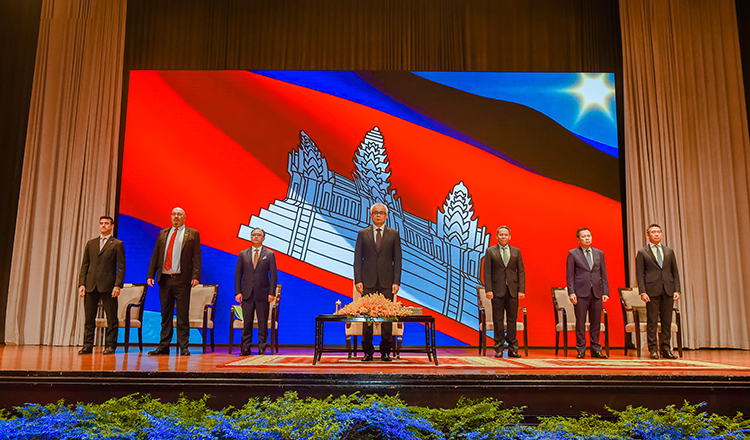
The European Chamber of Commerce (EuroCham) yesterday urged the new government in Cambodia to take steps to diversify its exports into services, as the country’s over-reliance on a few export sectors, such as garments, can make it susceptible to changes in global demand, trade policies and market competition.
This over-reliance on certain goods can lead to economic instability, job losses, and a lack of investment in other sectors, said the White Book 2024, a set of trade and investment policy recommendations collectively developed by EuroCham members through its 12 sectorial committees.
Minister of Economy and Finance Aun Pornmoniroth received the first copy of the book from EuroCham Chairman Tassilo Brinzer during the opening ceremony of the ASEAN-Cambodia Business Summit at Sofitel Phnom Penh Phokeethra.
Accordingly, the White Book recommended that the Royal Government of Cambodia facilitate the emergence of new service exports, including in areas such as human resources, accounting, medical, dentistry, and IT, by pushing for the implementation of service liberalisation commitments among RCEP signatories.
The White Book warned that a lack of diversification can lead to a lack of job opportunities and skills development in other sectors, which can hinder the country’s economic development and limit its potential for growth.
It reminded that services exports can provide higher-paying and more skilled jobs, contributing to a more equitable and sustainable economic development trajectory. Failure to diversify into services may result in a lack of investment in the country’s digital infrastructure and hinder its ability to attract foreign investment.
Finally, a failure to diversify into services may result in a lack of innovation and competitiveness in the global market, limiting the country’s ability to compete with other countries in the region.
It also asked the government to consult the private sector to discuss awareness-raising venues on the opportunities for Cambodia’s service and digital service exports.
The document also called for the government to continue the efforts to simplify customs clearance procedures as the surge in cross-border trade has placed increasing demands on the resources of the General Department of Customs and Excise (GDCE), due to the complexity of Customs procedures required to facilitate the transfer of goods in and out of the country.
Cambodia’s current challenges in processing times are reflected in the country’s international logistical rankings. The World Bank’s 2022 Logistics Performance Index saw Cambodia lag behind Thailand, Vietnam and Lao PDR on two key indicators – efficiency of Customs clearance processes and frequency with which shipments reach the consignee within scheduled or expected time, with scores of 2.2 and 2.7, respectively (value from one to five, with five being the highest).
The country fared slightly better on overall performance, still behind Thailand and Vietnam but tied with Lao PDR at 2.4. In addition, a 2018 estimate indicated logistics costs over sales in Cambodia at 20.5 percent in 2018, higher than Thailand and Vietnam.
The White Book also sought a formalised ‘Alternative Dispute Resolution’ process to address trademark rights infringement cases through relevant ministries.
It further urged the government to permit businesses to deduct reasonable training expenses to meet the Labour Law’s apprenticeship requirement, on a pro-rata basis from the applicable Apprenticeship Tax and also to recalculate work overtime limits on a monthly rather than daily basis, setting a maximum amount of monthly working hours to 260.
According to the White Book, Cambodia’s energy demand is expected to triple in the coming years, with or without an energy efficiency plan in place. “Appropriate incentives for renewable energy and more favourable legislation—including lower tax rates—for industrial solar panels could easily meet this growing demand for electricity in the country,” it said.
A growth in the country’s renewable energy share can significantly reduce power generation costs for EDC, while also reducing energy costs for consumers, private individuals, and factories alike.
Source: Khmer Times
Share: